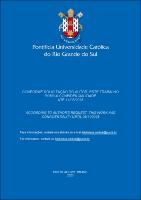| Share record |


|
Please use this identifier to cite or link to this item:
https://tede2.pucrs.br/tede2/handle/tede/10753| Document type: | Dissertação |
| Title: | Inteligência artificial na predição de risco de ventilação mecânica em casos graves de Covid-19 |
| Author: | Godoy, Mariana Frizzo de  |
| Advisor: | Padoin, Alexandre Vontobel |
| First advisor-co: | Hochhegger, Bruno |
| Abstract (native): | Introdução: Em dezembro de 2019, a cidade de Wuhan, na China, tornou-se centro de um surto de pneumonia de causa até então desconhecida, que logo teria o novo coronavírus, SARS-CoV-2, como causa identificada da doença. Em março de 2020, a OMS declarou a infecção como situação de pandemia. No primeiro ano da pandemia, era de suma importância que fossem identificados com rapidez os pacientes com maior potencial de má evolução e necessidade de ventilação mecânica, especialmente para organização de leitos de unidade de terapia intensiva, os quais foram muitas vezes escassos no Brasil. Objetivo: O presente trabalho tem como objetivo determinar a acurácia da tomografia computadorizada de tórax, avaliada por um modelo de aprendizado de máquina, na predição de necessidade de ventilação mecânica em pacientes hospitalizados com SRAG por COVID-19. Métodos: Trata-se de estudo de coorte retrospectivo, realizado em dois hospitais brasileiros. Foram incluídas TCs de pacientes hospitalizados por síndrome respiratória aguda grave e COVID-19 confirmada por RT-PCR. Desenvolveu-se um modelo de inteligência artificial, baseado em redes de convoluções neurais. Resultados: A sensibilidade do modelo foi de 0,417, e a especificidade 0,860. A área correspondente sob a curva ROC para o conjunto de teste foi de 0,68. Conclusão: Foi criado um modelo de aprendizado de máquina com elevada especificidade, capaz de prever de forma confiável pacientes que não precisarão de ventilação mecânica. |
| Abstract (english): | Introduction: In December 2019, the city of Wuhan, China, became the center of an outbreak of pneumonia of unknown cause, which would soon have the new coronavirus, SARS-CoV-2, as the identified cause of the disease. In March 2020, WHO declared the infection a pandemic situation. In the first year of the pandemic, it was extremely important to quickly identify patients with the greatest potential for poor outcome and need for mechanical ventilation, especially for the organization of intensive care unit beds, which were often scarce in Brazil. Objective: The present study aims to determine the accuracy of chest computed tomography, evaluated by a machine learning model, in predicting the need for mechanical ventilation in patients hospitalized with SARS due to COVID-19. Methods: This is a retrospective cohort study, carried out in two Brazilian hospitals. CT scans of patients hospitalized for severe acute respiratory syndrome and COVID-19 confirmed by RT-PCR were included. An artificial intelligence model based on neural convolution networks was developed. Results: The sensitivity of the model was 0.417 and the specificity 0.860. The corresponding area under the ROC curve for the test set was 0.68. Conclusion: A machine processing model with high specificity was created, capable of reliably predicting patients who will not need mechanical ventilation. |
| Keywords: | COVID-19 Tomografia Computadorizada Inteligência Artificial COVID-19 Computed Tomography Artificial Intelligence |
| CNPQ Knowledge Areas: | CIENCIAS DA SAUDE::MEDICINA |
| Language: | por |
| Country: | Brasil |
| Publisher: | Pontifícia Universidade Católica do Rio Grande do Sul |
| Institution Acronym: | PUCRS |
| Department: | Escola de Medicina |
| Program: | Programa de Pós-Graduação em Medicina e Ciências da Saúde |
| Access type: | Acesso Aberto |
| Fulltext access restriction: | Trabalho será publicado como artigo ou livro |
| Time to release fulltext: | 60 meses |
| Date to release fulltext: | 11/05/2028 |
| URI: | https://tede2.pucrs.br/tede2/handle/tede/10753 |
| Issue Date: | 30-Mar-2023 |
| Appears in Collections: | Programa de Pós-Graduação em Medicina e Ciências da Saúde |
Files in This Item:
| File | Description | Size | Format | |
|---|---|---|---|---|
| DIS_MARIANA_FRIZZO_DE_GODOY_CONFIDENCIAL.pdf | MARIANA_FRIZZO_DE_GODOY_DIS | 365.2 kB | Adobe PDF |  Download/Open Preview |
Items in DSpace are protected by copyright, with all rights reserved, unless otherwise indicated.




